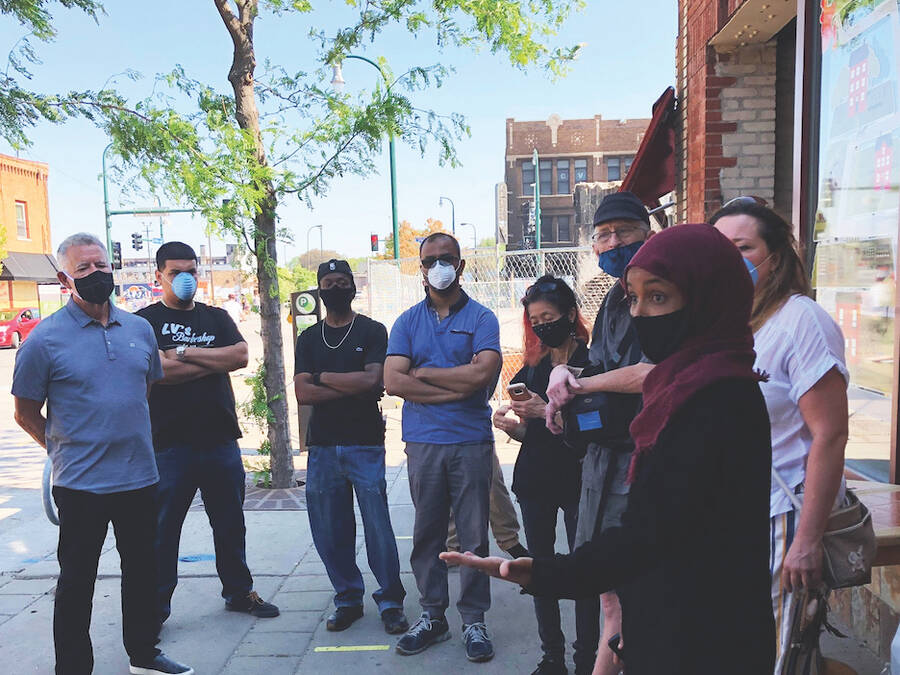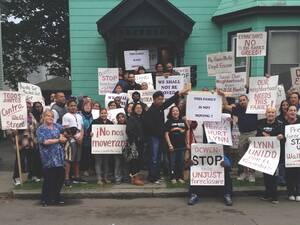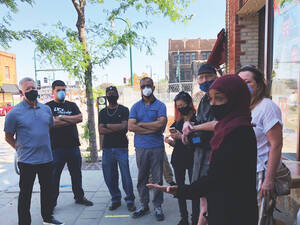On Homes for All
In the short term, we need to cancel rent and mortgages. In the longer term, we need to decommodify housing.

Click here to read the rest of the conversation.
WHEN I FIRST CAME to this country as a refugee at the age of 12, I was horrified by the number of people I saw experiencing homelessness on the streets of New York City. I remember turning to my father one day as we drove through the city and saying, “This is not the America you told us about.” “Hush child,” my father replied. “We will get to that America.” The America I’d dreamed of—the one my father had imagined back in Somalia—not only guaranteed equal protection under the law, but provided everyone the opportunity to live with dignity, to thrive. Two decades later, I’m still fighting for that America.
Sadly, in one of the wealthiest countries in the world, people sleeping on sidewalks is still the norm. In my home state of Minnesota, over 10,000 people faced homelessness in 2018; nearly half of them were kids. And that’s just in Minnesota. Across the country, over half a million people experience homelessness on a given night. Hundreds of thousands are living in temporary shelters or transitional housing, most of them caught in a perpetual cycle of housing insecurity. Many more people are at risk of losing their homes to eviction or foreclosure. In North Minneapolis, nearly half of all renters have experienced eviction within the last three years. Because affordable housing is so hard to come by for poor and working-class people, millions across the country—a disproportionate number of them people of color—constantly struggle to make rent or pay their mortgage, while many others fear being displaced from their homes by gentrification.
During the coronavirus crisis, those numbers are expected to soar as the economy nosedives into a recession. Thirty-three percent of Americans missed housing payments in July, while 21% of renters were behind on their rent as of mid-July. As eviction moratoriums began to expire, experts estimated that 30–40 million people were at risk of being evicted by the end of the year. Though the Center for Disease Control’s federal eviction moratorium, announced at the beginning of September, may keep some renters in their homes until January, those who can’t pay will still owe back rent, putting them in a precarious position even after the virus is brought under control and the economy begins to recover. That’s why, at the beginning of this crisis, I introduced the Rent and Mortgage Cancellation Act, which would permanently cancel all rent and mortgage payments until the end of the pandemic. The legislation would also create a Home Lenders Relief Fund, operated by the Department of Housing and Urban Development, to support landlords and mortgage holders. And the bill would establish an optional fund that would help nonprofits, public housing authorities, cooperatives, community land trusts, and state or local governments to purchase privately owned rental properties, expanding affordable housing even after the pandemic ends. All of this would be fully funded by the federal government—because in times of great crisis, we must guarantee that all Americans have roofs over their heads.
We must come to understand housing not as a commodity, but as a human right.
But as we know, the housing crisis didn’t begin with the coronavirus crisis. Even in times of relative economic stability, our current free-market housing system fails poor and working-class people. The pandemic has laid bare the deep disparities inherent to our housing system, while further exacerbating them. We must respond by reassessing—and fundamentally transforming—our approach to housing. We must come to understand housing not as a commodity, but as a human right.
We can do this by investing in housing on a scale not seen since the New Deal. Last year, I introduced the Homes for All Act—a long-term vision for solving housing insecurity in this country. This legislation authorizes the construction of 12 million new public housing and private affordable units and creates a separate fund for neighborhood stabilization to protect families from gentrification and prevents displacement. It also makes public housing a mandatory part of the federal budget, just like Medicare and Social Security. Investing in public housing will expand the available affordable housing stock, which will drive down costs throughout the market.
With so many urgent crises unfolding before our eyes, it’s easy to neglect the looming threat of climate change. But the climate emergency is already devastating communities across the globe—disproportionately impacting Indigenous communities and people of color. As more people are displaced by this crisis, we must construct housing units that adhere to the highest available environmental standards. Under Homes for All, public housing will be designed, built, and operated in accord with the highest standards to ensure the safety of all tenants. Decarbonizing housing—also a core part of the Green New Deal—will allow all people, regardless of zip code, the opportunity to thrive.
How will we pay for all this? The answer is simple: by shifting the broken priorities that we as a nation have accepted for far too long. Instead of giving millionaires and corporations huge tax breaks, we can house our homeless. Instead of spending trillions of dollars to fund endless wars, we can provide an avenue for the poor and middle class to purchase a home. We could easily fund Homes for All by repealing Trump’s disastrous tax cuts and reining in wasteful Pentagon giveaways.
Investing in affordable housing will send ripple effects throughout our country. My bill will employ thousands by providing well-paying jobs to construct and outfit new homes. It will also improve the health and well-being of thousands of families by giving them safety and stability. And most importantly, it will significantly reduce homelessness by guaranteeing a home for the millions who currently have none.
Tremendous challenges also present us with tremendous opportunities. In this perilous time, we have an opportunity to take a huge step toward creating the America that I and so many of us have dreamed about—the America that my father wanted for his children and grandchildren. It’s time to come together and act on our shared values to guarantee housing as a human right once and for all.
This article is not an endorsement of any particular party or campaign.
Ilhan Omar is a Democratic congresswoman from Minnesota.




